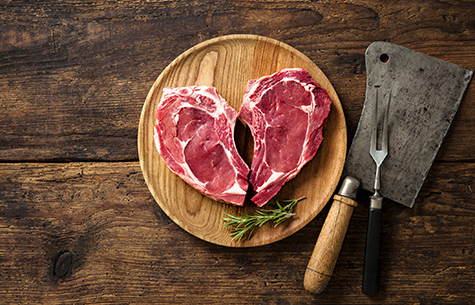February Heart Health Tip: Don’t Overload This Mineral

February is officially Heart Health Month marked by one of my favorite days, which just passed, Valentine’s Day. Even better, the Valentine’s chocolate we all have been consuming and love so much is actually good for our heart. Well, not all the sugar and fat, but its cocoa content. Cocoa is full of nutrients that protect both your heart, and your brain. But, if you also like to eat red meat frequently, you may be getting too much of a certain mineral that can undermine your heart health. Let me tell you why you should limit this mineral…
Love Your Heart This February – Limit Iron
February is the month we all try to express the love we feel for special people in our life. We give heart-shaped Valentines and boxes of chocolate and other mementos to remind them of our love. But, “love month” February should also be a reminder to you to love your own heart by keeping it healthy and strong for many years to come.
Heart disease is still the #1 killer of men and women in the United States. It’s also the #1 “disabler” – preventing thousands of people who’ve had heart attacks, or strokes, from working or enjoying their lives. Next to cancer, heart disease is also one of the U.S.’s most costly health problems, costing us over $300 billion a year! So, knowing how to prevent heart disease can go a long way in keeping your heart healthy.
But, most people don’t realize that they may be doing something every day that could be silently undermining their heart health. You watch your weight, eat the recommended fruits and vegetables, exercise regularly, limit alcohol, and ban smoking. But, there still might be one high risk heart practice that you’re doing…consuming too much iron.
Don’t get me wrong. Iron is an important mineral that you need to prevent anemia, especially as you get older. It helps build red blood cells that carry life-giving oxygen to your brain, heart and every part of you. Your bones also need a certain amount of iron to keep them regenerating and strong. Your heart also needs iron. The problem is, you don’t need very much.
And, if you like your red meat several times a week, or you eat fortified foods, you could be getting way too much of it. You could actually be building up iron in your tissues and vascular system that can age you faster and spell disaster for your heart and brain.
Over a decade ago, Japanese researchers out of the Kurume University of Medicine, reported that too much iron damages the lining (endothelium) of blood vessels. That damage then leads to thickening and hardening of blood vessels, or atherosclerosis. They were the first to raise the red flag that too much iron intake was a high risk factor for heart disease.
Why does iron, a mineral that we need, also damage blood vessels? The Japanese researchers found that iron buildup resulted in a lot of free radicals from oxidation. To prove this, they gave study participants iron chelating agents. They had about a 30% reduction in iron levels and their blood vessels started to dilate and work normally again. It’s thought that the reduction in monthly blood iron in pre-menopausal women is what protects women in this age group from heart attack. After menopause, if their iron stores increase, so does their risk for heart attack.
Recently, studies out of the Buck Institute for Age Research also found that excess iron in body tissues leads to premature aging and disease. They were able to significantly age lab animals just by feeding them excess iron. The iron was found to create clumping in the proteins already associated with aging. When the animals were given iron chelating agents, the proteins de-clumped, the aging process slowed, and their lifespan extended. It’s also now believed that toxic levels of iron in brain tissues contributes to the development of Alzheimer’s and Parkinson Disease.
How To Limit Your Iron Intake
Limiting your heme iron intake can prevent iron overload and will go a long way in preserving your heart and brain health. Men over 40 only need 8 mg of iron a day. Women over 40, who are premenopausal, need 18 mg. After menopause though, a woman’s need for iron drops to 8 mg. If you’ve had a lot of blood loss through surgery, or an accident, you may need more temporary iron to rebuild your iron stores. But, for general daily intake, your iron intake should be relatively low.
Here are some easy ways to get enough iron but not too much:
1. Limit red meat, an abundant source of heme iron, to 6-8 ounces twice a week.
2. Seafood, like salmon, also contain good amounts of heme iron as well.
2. Buy multivitamins without iron.
3. If you eat cereals, choose one that is not overly fortified with iron. Several claim their products have 100% of your day’s need for iron. This can be 11 grams or more, which is more than a man or woman over 50 need. If you eat other iron-containing foods throughout the day, you’ll be storing too much iron.
4. Consume 1-2 servings of a natural food iron chelator per day. For example, green tea, wheat grass, cilantro, garlic, broccoli. Several studies have shown that these natural iron chelators can reduce excess iron in blood and tissues. But, don’t go overboard on these either. You don’t want to become iron deficient either.
5. Get enough folate, and other B vitamins. They help decrease homocysteine levels, a heart-destructive protein that builds up in relation to iron.
Even though you need iron for good health, too much of a good thing can be bad. Talk to your doctor about your iron and homocysteine levels to assess your iron needs and risk. They can both be tested with a simple blood test.
